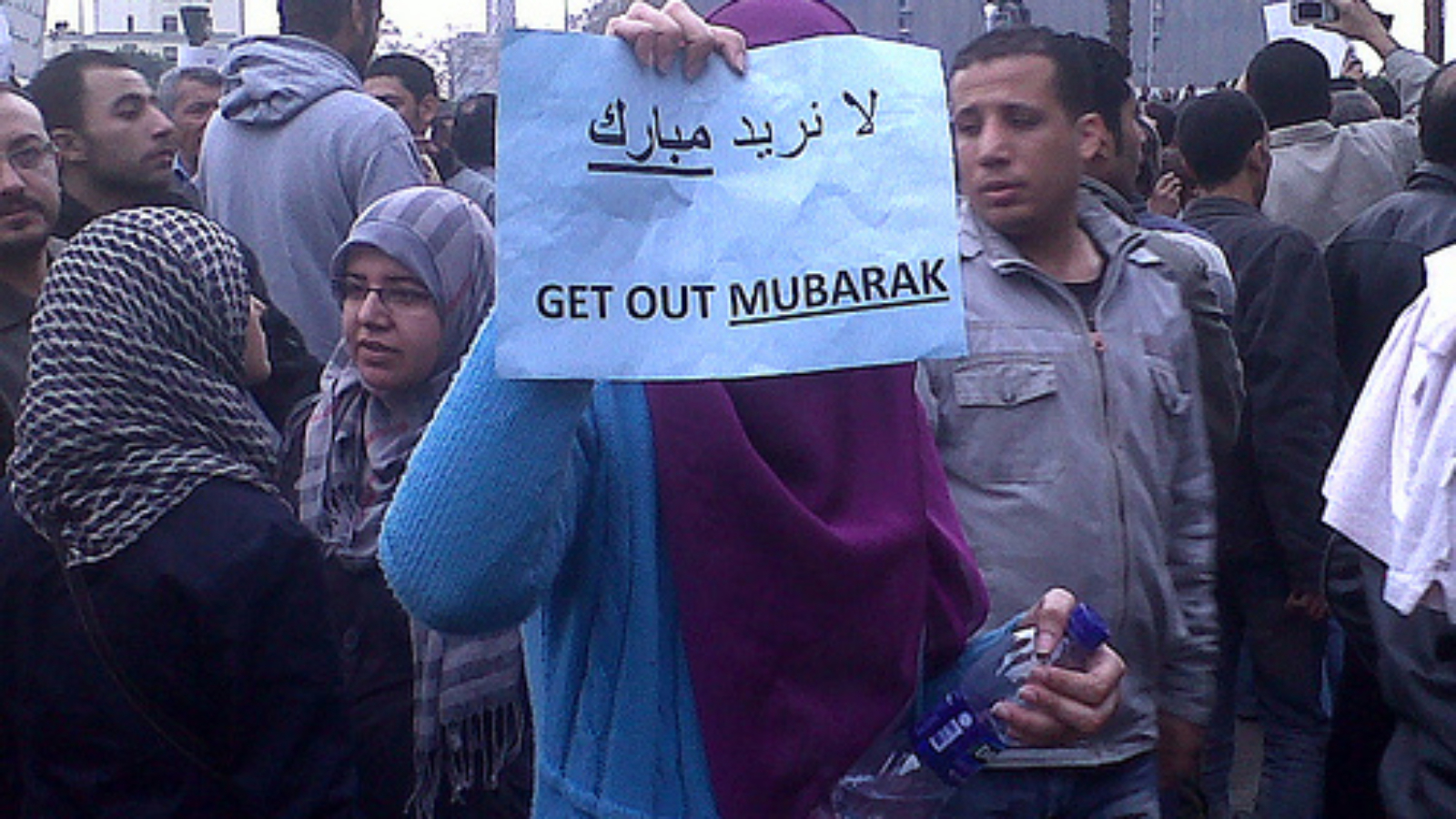[Above: Protestors in Cairo's Tahrir Square. Image courtesy of Flickr user monasosh.]
By Hassan Malik
Yesterday, on the sixth day of a political uprising in Egypt that seems poised to become a revolution, former International Atomic Energy Agency director and Nobel Laureate Mohamed ElBaradei addressed a curfew-defying crowd of thousands in Cairo's Tahrir Square. "We have a key demand: for the regime to step down and to start a new era," ElBaradei said through a megaphone. Earlier in the day, ElBaradei had appeared on the CBS News program "Face The Nation" and exhorted the United States "to stop the life support to the dictator and root for the people."
Yet the response of major Western powers to this unprecedented popular revolt against one of the world’s longest-running dictatorships has been disappointingly cautious. Major Western political leaders like Hillary Clinton, David Cameron, and Barack Obama have made repeated calls for "restraint on both sides," and urged Egypt's geriatric tyrant to "listen" to his people and start a process of "reforms." This muted Western reaction to the protests in the Middle East is rooted in a fear of "the Arab street" that has shaped Western policymaking in the Middle East since the 1980s, if not earlier.
Western commentators generally use the term "the Arab street" to evoke a dark, ignorant, brutal place, whose residents are illiterate, illiberal, and ill-suited to the responsibilities of liberal democracy. According to this view of the region, the masses gathered in the Arab street – too savage to form "public opinion" – need a strong leader to keep them in check.
Yet events in Egypt and elsewhere have exposed the myth of "the Arab street" as a shallow caricature of the complex reality behind the revolutionary movements now sweeping the Arab world. The young Tunisian fruit vendor whose self-immolation helped sparked the recent waves of protests in Tunisia — and later Egypt — defied the stereotype of religiously radicalized Arab youth. Mohamed Bouazizi had a girlfriend and enjoyed playing cards: hardly the profile of a Muslim extremist. And he died not by setting off a suicide bomb but by burning himself to death to protest a regime that had slapped him in the face once too often. His act inspired Tunisians of all classes and of varying depths of religious conviction.
In neighboring Egypt, a similar dynamic has taken hold. The first protests last week were dominated by young people responding to the fatal beating of a young Alexandrian in an Internet cafe by two policemen. But as the movement grew, all strata of Egyptian society — middle-class, poor, Muslim, Christian, literate and illiterate — joined in. An emblematic leaflet showed a riot policeman who had switched to the protestors' side arm-in-arm with an older, veiled woman in traditional dress and a chic, young woman in Western clothes.
Significantly, the Islamist Muslim Brotherhood – the bogeyman of Egyptian politics, fear of which has led Western governments to prop up the Mubarak regime, which eagerly stoked Western anxieties about the group – was conspicuously absent during the early stages of the revolt. The Brotherhood is surely waiting for a propitious moment to exert more direct influence on the course of the revolution. Indeed, yesterday it announced its formal support for ElBaradei, an entirely secular figure. Nevertheless, the sheer diversity of the protestors, their basic demand for democracy and the rule of law, and the relative lack of Islamist demands show that "the Arab street" is hardly a monolith driven by religious fanaticism.
Many in the West are desperately hoping ElBaradei will emerge as the new ruler of Egypt, since he and his views are known quantities. Others hope that the military will take control. However, things are moving extremely fast in Egypt, and it is conceivable that events may yet outpace ElBaradei — and even the Army. In fact, it is entirely possible that Egypt will see a new crop of home-grown leaders emerging over the coming months. Students of revolution know it to be chaotic, volatile, unpredictable, and often bloody. The revolutions in North Africa are still in their early stages; but that is precisely why the words and deeds of the United States and other leading democratic powers matter so much right now. Time is running out for them to have any constructive impact on events.
President Obama's public call for Hosni Mubarak to show restraint and institute reforms, while strongly worded, fell far short of proposing any concrete action, and showed Obama to be woefully behind the curve regarding events on the ground in a country of critical importance to regional and global security. The Obama administration should immediately make it clear that U.S. military aid to Egypt will be suspended unless Mubarak and the Army announce a plan for a peaceful transition and free and fair elections.
Western leaders must realize that in a situation like the one unfolding in Egypt, not taking a position is itself a position, and that waiting to support a transition from Mubarak to democracy until after the fact will be too little, too late. If the Egyptian revolution takes on an anti-Western cast after protestors have overthrown a regime that fired bullets and tear gas canisters labeled "Made in the U.S.A" at them, and after Western leaders failed to back their legitimate calls for freedom, the West will have only itself to blame – and not some mythical, genetically-wired anti-Western extremism in the Arab world.
It is time for Washington and its allies to drop their fears of "the Arab street" and unequivocally and genuinely support the popular revolution in Egypt — or to get out of the way.
Hassan Malik is a PhD candidate in international history at Harvard University.
